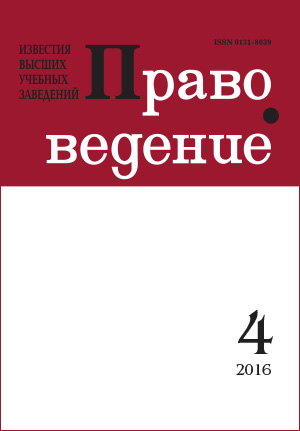Several introductory words about “Effiency Of Law” by Eugenio Bulygin
Abstract
This paper deals with the basic perspectives of the article by the famous Argentinian legal scholar Eugenio Bulygin that was devoted to the problem of efficiency of law. That article has been written in the very beginning of scholarly career of Professor Bulygin; it reflects the level of discussions on this problem in the world legal science in the mid1960s. Professor Bulygin analyses how efficiency of law was thought as per validity of law in the conceptions of the leading representatives of legal positivism such as Hans Kelsen, Alf Ross or Herbert Hart. Bulygin asserts that the correct way to think objectivity is to accept that it is possible to deduce a judicial decision from a general rule of law. For Bulygin, the key to solve this problem is to draw the distinction between legal rules and legal propositions with the help of which legal rules are posited. From the standpoint of Bulygin’s conception of efficiency of law, legal rules are effective if they are applicable or justiciable. Justiciability is the quality of legal rules, which is considered in the terms of reasonable expectations about enforceability of these rules by judicial, and other lawapplication organs when adjudicating disputes. Publication of this article by Bulygin led to a discussion with Hans Kelsen who critically assessed the ideas set forth in the article. In this perspective, the article of Bulygin is an important mark in development of legal philosophy in the 20th century.
Keywords:
efficiency of law, applicability of law, justiciability, binding force of law, legal positivism, legal rules, law-enforcement
Downloads
References
Downloads
Published
How to Cite
Issue
Section
License
Articles of "Pravovedenie" are open access distributed under the terms of the License Agreement with Saint Petersburg State University, which permits to the authors unrestricted distribution and self-archiving free of charge.




